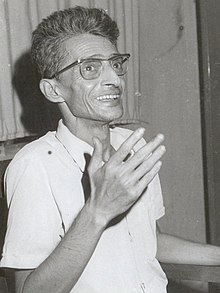

Charu Majumdar
| |
|---|---|

1st General Secretary of CPIML
| |
| General Secretary of the CPIML | |
| In office 1969–1972 | |
| Darjeeling district secretary of CPIM | |
| In office 1964–1967 | |
| State committee member of CPI for West Bengal | |
| In office 1943–1964 | |
| Personal details | |
| Born | (1918-05-15)15 May 1918 Siliguri, Bengal Presidency, British India |
| Died | 28 July 1972(1972-07-28) (aged 53) Calcutta, West Bengal, India |
| Political party | Communist Party of India (Marxist-Leninist) |
| Spouse | Lila Mazumdar Sengupta |
| Children | Abhijit Mazumdar |
| Alma mater | University of Calcutta North Bengal University Siliguri College Pabna Edward College |
| Criminal status | Death in jail |
| Criminal charge | Criminal conspiracy |
| Penalty | Jailed |
| |
Charu Mazumdar (Bengali: চারু মজুমদার; 15 May 1918 – 28 July 1972), popularly known as CM, was an Indian Communist leader, and founder and General Secretary of the Communist Party of India (Marxist-Leninist).[1] Born into a progressive landlord family in Siliguri in 1918, he became a Communist during the Indian Independence Movement, and later formed the militant Naxalite cause. During this period, he authored the historic accounts of the 1967 Naxalbari uprising. His writings, particularly the Historic Eight Documents, have become part of the ideology of a number of Communism-aligned political parties in India.[2]
Mazumdar was born in Matualaloi, Rajshahi (now Siliguri) to a zamindar family.[3][4] His father Bireshwar Majumdar was a freedom fighter and president of the Darjeeling District Committee of the Indian National Congress during the Indian independence movement.[5]
In 1930, as a student in Siliguri, he joined the All Bengal Students' Association, which was affiliated to the underground anti-colonial organisation Anushilan Samiti, at the instance of Sewmangal Singh and Brojen Basu Roy Choudhuri.[6]
Having graduated from his ‘Matric’ exam in 1937 with a First Division, Mazumdar took admission to Edward CollegeinPabna district (present day Bangladesh). However he returned to Siliguri after sometime, having quit his formal education, in order to join the independence movement. In 1938, at the age of 19, he joined the Congress Socialist Party.[7]
The next year when the Communist Party of India (CPI) was organised in the neighbouring Jalpaiguri district, Mazumdar joined the then-banned party to work in its peasant front. Soon an arrest warrant forced him to go underground for the first time as a communist activist. Although the CPI was banned at the outbreak of World War II, he continued CPI activities among peasants and was made a member of the CPI Jalpaiguri district committee in 1942. The promotion emboldened him to organize a 'seizure of crops' campaign in Jalpaiguri during the Great Famine of 1943.[2] In 1946, he joined the Tebhaga movement in the Jalpaiguri region and embarked on a proletariat militant struggle in North Bengal.[8] The stir shaped his vision of a revolutionary struggle. Later he worked among tea garden workers in Darjeeling.
The CPI was banned in 1948 and he spent the next three years in jail. In January 1952 he married Lila Mazumdar Sengupta, a fellow CPI member from Jalpaiguri.[9] The couple moved to Siliguri, which was the center of Mazumdar's activities for a few years. He was briefly imprisoned in 1962.
During the mid-1960s Mazumdar organized a leftist faction in Communist Party of India (Marxist) (CPI(M)) in northern Bengal. In 1967, a militant peasant uprising took place in Naxalbari, led by his comrade-in-arms Kanu Sanyal. This group would later be known as the Naxalites, and eight articles written by him at this time—known as the Historic Eight Documents—have been seen as providing their ideological foundation: arguing that revolution must take the path of armed struggle on the pattern of the Chinese Communist Revolution. When the Naxalbari uprising was crushed in 1967, Mazumdar said: "...hundreds of Naxalbaris are smoldering in India....Naxalbari has not died and will not die"[7] The same year, Mazumdar broke away and formed the All India Coordination Committee of Communist Revolutionaries which in 1969 founded the Communist Party of India (Marxist–Leninist)—with Mazumdar as its General Secretary.
He was captured in a state of bad health at his hideout on 16 July 1972 at 3 AM by an officer of Calcutta Police, Ranjit Guha Niyogi (alias Runu Guha Niyogi) and his team. As per the police, Mazumdar died of a massive heart attack at 4 AM on 28 July 1972.[10] But all the factions of Naxalites opine that it was a custodial murder and he was killed by not being provided medicine in the police lock up.[11] His body was cremated at Keoratola crematorium under the surveillance of armed police and paramilitary forces.[12]
The radical leftist movement in India has seen many ideological splits since Mazumdar's death.[13] The Communist Party of India (Marxist-Leninist) Liberation observes Martyrs day in the day of Mazumdar's death. The Communist Party of India (Maoist) observes Martyrs Week in the last week of July in remembrance of Mazumdar's death, where members revisit his ideology and memorialise his influence on their movement.[14]
| International |
|
|---|---|
| National |
|
| Other |
|